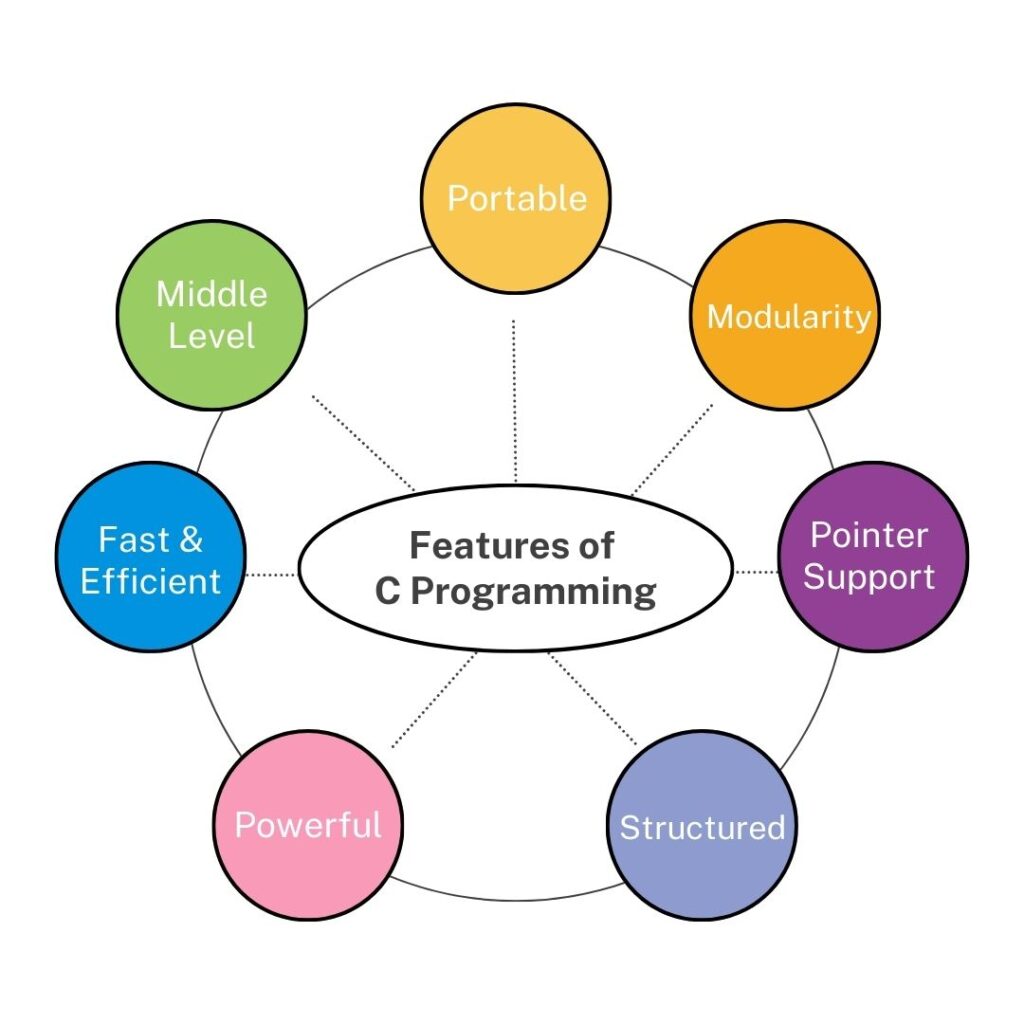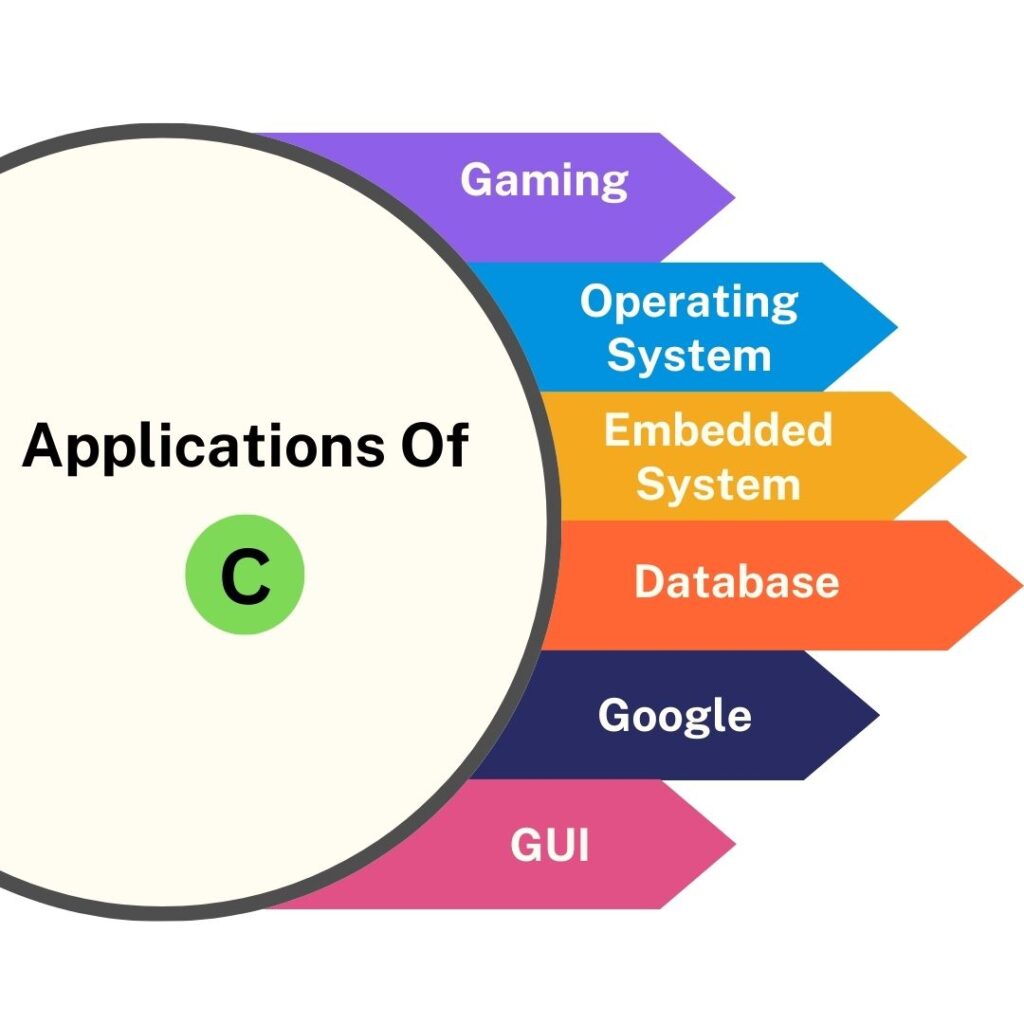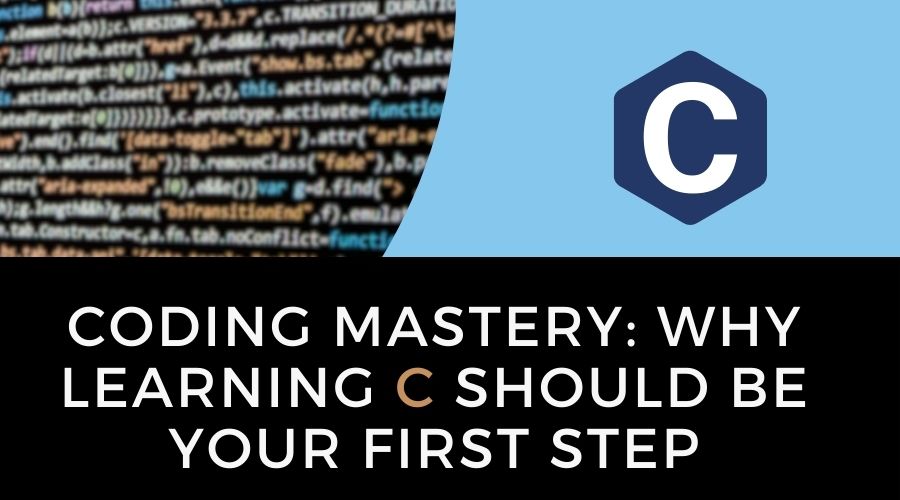Welcome to the exciting world of programming! When you first start learning to code, you may not know where to begin. The language you choose for your first steps into the broad world of coding is critical in developing your understanding of programming concepts. This blog post will highlight a programming language that has endured and is still essential for anyone aspiring to become an expert coder: C.
Learning a language that imparts sound programming ideas is essential to become a skilled coder, just as a strong foundation is required for building a sturdy house. We’ll look at why C should be your first pick on your thrilling journey into the world of coding in this beginner-friendly guide. Knowing why C is a great place to start can put you on the right track toward becoming a coding expert, regardless of your level of experience. Together, let’s take the first step and discover why C is still so popular in the programming world!
Table of Contents
Significance of Choosing the Right Programming Language
Similar to speaking a language, programming has multiple languages, just as there are several kinds of languages in the world. Selecting the appropriate language is essential because each has its own advantages and functions. Selecting the appropriate tool for a given task is similar to choosing the right tool for the job—you wouldn’t hammer a nail with a wrench. The foundation for your ability to express yourself and solve issues in the digital world is similar to that of programming languages.
Why C as the First Step Towards Coding Mastery
Consider learning to program as like to learning to ride a bike. Before you can ride with confidence, you must first learn the fundamentals on training wheels. C is comparable to those training wheels in the world of coding. It’s the cornerstone, the first step, and mastering it now will prepare you for later success in increasingly difficult languages. Understanding C is a great place to start if you’re interested in learning programming. It’s similar to learning the fundamentals of driving before you become a skilled driver.
The Foundational Importance of Choosing the Right Language
Learning to code is similar to learning a new language. It’s simpler to learn some languages than others. If you begin with a language that is too difficult for you, you may become discouraged and give up. Rather than beginning with a more straightforward language like English, try learning French as your first language. It would be difficult, wouldn’t it? Similarly, some programming languages are more difficult to learn than others. The learning curve describes how quickly or slowly you can understand and use a language. The process goes more smoothly if you start with a language that has a gentle learning curve.
When you learn to code, you are not only learning how to make a computer do things; you are also learning the fundamental principles that apply to all coding languages. Consider it similar to building a house. Before you start decorating and adding rooms, you want a solid foundation. The fundamentals of programming are the core concepts that every programmer must understand. Selecting a language that emphasizes these principles is similar to building a solid foundation for coding skills from the beginning. Since you already know the fundamentals, learning new languages in the future will be simpler.
To put it simply, selecting a programming language is similar to selecting a suitable place to begin your coding adventure. It’s about selecting a language that teaches you the fundamentals of coding and isn’t too difficult for beginners. By doing this, you place yourself for success and build a solid foundation for your future coding adventures.
Understanding C: The Foundation of Programming
Dennis Ritchie, a computer scientist at Bell Labs, created the C programming language in the early 1970s. The programming language C was developed as an advancement of B, incorporating new functions and enhancements. The original purpose of C was to aid in the creation of the Unix operating system, which served as the model for many modern operating systems.
Overview of C’s Syntax and Structure
C’s Syntax:
Programming syntax is the collection of guidelines that specify how programs have to be written. It is comparable to a programming language’s grammar. Because of its comparatively simple and straightforward syntax, C makes it easier for beginners to understand and write code. The fundamental components of C code consist of variables, functions, and statements, which are arranged in an understandable manner.
Statements: Your code consists of these discrete instructions. Every statement carries out a particular function, such as setting a variable’s value or displaying text on the screen.
Variables: Variables are used in C to store and manage data. A variable can be named and functions similarly to a container holding a value. To store someone’s age, for instance, you could have a variable named age.
Functions: Functions are code blocks that perform a specific task. They simplify understanding and modularity in your program. A program in C typically begins to run from the main function, but you can write your own functions to carry out various tasks.
C’s Structure:
C programs have an organized and hierarchical structure. Consider it like building with blocks. Each block (function) serves a specific purpose, and these blocks can be used to build your entire program. Here’s how it works:
- Main Function: The main function is where every C program begins to execute. This is the point at which the program starts running. It’s similar to the start of your program.
- Blocks of Code: You have code blocks inside the main function and other functions you write. The statements that specify the functions of your program are found in these blocks. The curly braces {} enclose blocks.
- Control Structures: C offers structures that let you manage the program’s flow, such as while, if, else, and for. For example, you can use an if statement to make decisions in your code.
In conclusion, C’s structure is similar to a building’s architecture, and its syntax is similar to the language it speaks. Understanding both is critical because it allows you to communicate effectively with the computer and create complex programs.
The Role of C in Shaping Other Programming Languages
C had a significant impact on the creation of many other programming languages. C contains syntax and ideas that have been borrowed by languages like C++, C#, and Objective-C. Other languages were inspired to be created based on C because of its efficiency and portability. C’s versatility and power are demonstrated by the fact that many operating systems, including Linux and parts of Windows, are written in it.
The Advantages of Learning C

Certainly! Let’s break down the advantages of learning C first in a simple and easy-to-understand way:
- Clear Syntax: Because of its simple and clear syntax, even newcomers can easily understand and write code in C.
- Minimalistic Structure: Because C has fewer built-in functions and features than some other languages, you will need to write more code yourself. This simplicity improves your understanding of the code’s operation.
- Core Programming Concepts: Understanding basic programming concepts, such as variables, loops, and functions, which are shared by many programming languages, is made easier by learning C.
- Problem-Solving Approach: C encourages a problem-solving approach, which is a crucial skill that can be used with any programming language. Once you have a solid understanding of problem solving in C, you can transfer that knowledge to other languages with easily.
- Direct Memory Manipulation: C makes it possible to directly manipulate computer memory, providing you with knowledge about how computers manage data at a low level.
- Hardware Interaction: Understanding C gives you a foundational understanding of computer architecture and system-level programming, enabling you to understand how software interacts with hardware.
Starting with C essentially gives you a strong foundation in the fundamentals of programming, develops transferable skills to other languages, and gives you a deeper comprehension of the internal workings of computers. This shortens the learning curve for other languages and gives you a strong toolkit to tackle a wide range of programming tasks.
Building a Solid Foundation in Coding
When it comes to programming, memory is similar to a workspace—it allows your computer to store and retrieve data. Consider it a large desk with drawers. You must organize what goes where if you want to use the desk effectively. Each drawer has a different capacity.
You are the memory manager in C. This is how it operates:
- Manual Memory Allocation: In C you have direct memory control, unlike in some other languages. You can decide when to ask for desk space (allocate memory) and when to free up space (deallocate memory).
- Pointers: Consider pointers as desk-specific arrows pointing in particular directions. Pointers allow you to directly access and manipulate data. It’s like having a magic wand to touch and change things on the desk.
- Efficiency: You have control over memory, so you can make the best use of it. This control is a useful tool even though it may seem like extra work. It enables you to write quick, effective, and resource-friendly programs.
Learning C with the Basics of Algorithms and Data Structures
In the world of programming, algorithms and data structures are the equivalent of recipes and containers. They support efficient information processing and organization. Assume you are arranging a library of books:
- Algorithms: These are step-by-step instructions for tasks. An algorithm for book organization could be a set of guidelines for classifying books according to genre or alphabetically.
- Data Structures: Consider these as various kinds of bookshelves. While some shelves work well for dynamic organization (linked lists), others are best for quick access (arrays).
How C helps in learning:
You can directly implement data structures and algorithms with C. Gaining practical experience helps you better grasp the idea behind the code. You’ll observe how various data structures impact the speed and effectiveness of your program as you put algorithms into practice. It’s similar to trying out different designs for bookshelves to see which one works best.
C’s Influence on Problem-Solving Skills
In general, programming is problem-solving. It looks like a detective trying to determine the most effective course of action in a case. C is your detective kit and magnifying glass.
This is how C improves your ability to solve problems:
- Low-Level Understanding: C operates closer to the hardware, giving you a deeper understanding of the fundamental functions. It’s similar to knowing how your detective tools operate on an internal level.
- Debugging: When something goes wrong, C teaches you how to be an expert detective. You’ll gain proficiency in problem-solving and issue-tracing. It’s like solving a mystery and identifying the culprit in your code.
- Critical Thinking: C encourages you to think critically. Your mindset will shift to one of problem-solving, where bigger problems are broken down into smaller, more manageable tasks, similar to how a complex case is solved one clue at a time.
Real-world Applications of C Programming

- Operating Systems:
When it comes to building the main control system of your computer or phone, C is the master chef of computer languages. It’s the reason your device can perform all of its functions effectively.
Example: Windows, macOS, and Linux (the system that powers many servers and Android phones) are all built using C. - Embedded Systems: Consider C to be the superhero working behind the scenes in everyday devices such as your washing machine or the tiny computer inside your smart thermostat. It allows these devices to function more efficiently.
Example: Most likely, C programming is used in the software that regulates the temperature in your refrigerator or the engine performance in your automobile. - Game Development:
C is the programming language that powers your favorite video games, if you enjoy playing them. It’s like the secret sauce that contributes to the game’s graphics and enjoyment.
Example: C is used in a lot of well-known video games, like Fortnite and Minecraft, to manage the complex background operations. - Database Management Systems (DBMS):
C is essential for managing and organizing massive volumes of data. It is similar to the librarian who makes sure all of the books (data) are readily available and in order.
Example: C is necessary for MySQL, a popular database system, to manage and retrieve data effectively. - Networking Software:
The language known as C facilitates internet-based device-to-device communication. It functions similarly to the translator that makes sure everyone speaks the same language.
Example: C is necessary for efficient communication in the software that lets you browse websites and make online video calls.
Tips for Learning C
Learning C can be a rewarding but sometimes challenging journey, especially for beginners. Here are some simple and easy-to-understand tips to help you master the C programming language:
- Start with the Basics:
Start by becoming familiar with the fundamental ideas of C, including variables, data types, and loops. These are the fundamentals of programming, and mastering them will help you understand more complex topics. - Practice Regularly:
Practice makes perfect, just like with any other skill. Write basic programs first, then work your way up to more complex ones. Practice boosts confidence and helps you retain what you’ve learned. - Read and Analyze Code:
Examine existing C code written by others. Not only does reading code introduce you to various coding styles, it also helps in your understanding of how experienced programmers organize their programs. Make an effort to read and understand the logic of the code. - Understand Memory Management:
Since C provides you with direct control over memory, it is essential to understand memory allocation and deallocation. To avoid common errors, familiarize yourself with concepts such as pointers and dynamic memory allocation. - Work on Real-World Projects:
Apply your knowledge to use on real-world projects. Working on projects, whether they be little games or basic utility programs, teaches you how to apply your knowledge to real-world situations. - Use Online Resources:
Make use of online forums, courses, and tutorials. There are a variety of resources available that help to various learning styles. - Ask for Help When Needed:
Never be afraid to ask for assistance when you need it. Stack Overflow and other programming communities, as well as friends and mentors, can offer insightful advice and solutions to any issues you may be having. - Debugging Skills Matter:
Get proficient at debugging your code. Error detection and correction is an essential programming skill. Recognize and know how to find and fix problems using debugging tools and techniques. - Experiment and Be Curious:
Try out different things with your code without fear. To gain a deeper understanding of C programming, try experimenting with different strategies and follow your curiosity about the inner workings of things. - Stay Patient and Persistent:
Any programming language takes time to learn. Remain patient with yourself and resist giving up in the face of difficulties. Persistence is essential, and each problem solved brings you one step closer to mastering C.
In conclusion, mastering C is comparable to creating a solid building foundation. It offers the basic ideas and building blocks of programming that are necessary for any programmer to know. Because of its readability and simplicity, C is a great place to start because it makes sure you fully grasp the fundamentals. Additionally, learning C gives you transferable skills that you can quickly apply to other programming languages. You’re not just learning a language when you learn C; you’re also picking up the essential abilities that will enable you to write code with flexibility and power.
While learning to code can seem difficult at first, starting with Learning C is like taking that important first step. It embarks on a journey to make you an expert coder and opens up a world of possibilities. Take risks, make errors, and grow from them without fear. The programming community is large and friendly, and there are lots of resources available. Keep in mind that all great programmers got their start somewhere, and learning C is a great way to take off on an exciting journey into the world of programming. So go ahead, make the initial move, accept the difficulties, and enjoy the journey of learning to code!
